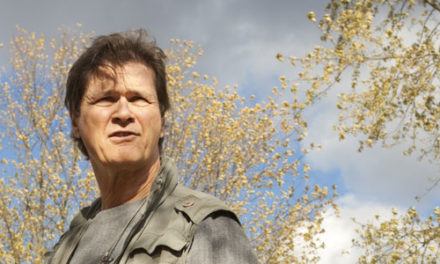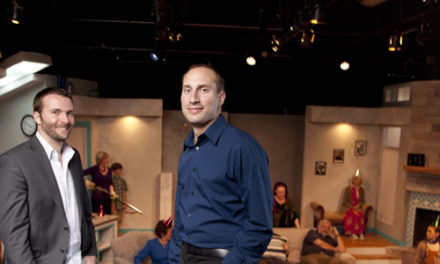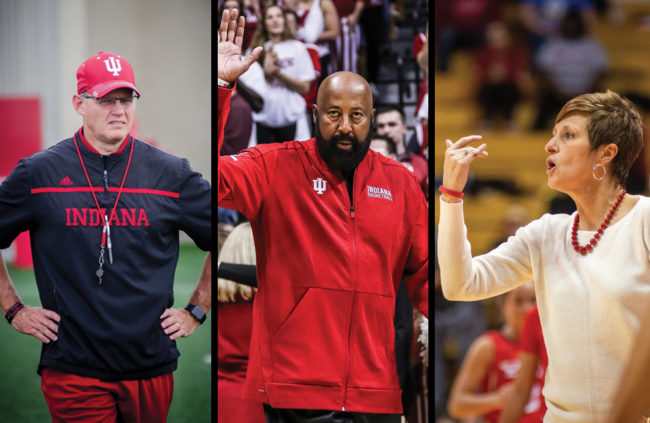
photography by RODNEY MARGISON
interviews by RODNEY MARGISON and MALCOLM ABRAMS
Never in the history of Indiana University Athletics has there been a season like the one about to begin. Coming off a painful pandemic year, IU teams are poised to do great things and expectations have never been higher.
Hoosier football, under the direction of National Coach of the Year Tom Allen, has a realistic shot at winning the Big Ten championship for the first time since 1967 and maybe even making the Final Four. Memorial Stadium should be packed with IU fans for every home game.
Hoosier women’s basketball, led by seven-year coach Teri Moren, has already achieved more than any IU women’s team ever and last season made it to the Elite Eight. With all the star players returning, a Big Ten title is attainable, as is a Final Four finish or even a national championship.
Hoosier men’s basketball, with former IU star player and NBA coach Mike Woodson at the helm, will be gunning for a top Big Ten finish and a sustained run in the NCAA Tournament.
Great Expectations, for sure. Hear what the coaches have to say in these exclusive interviews.
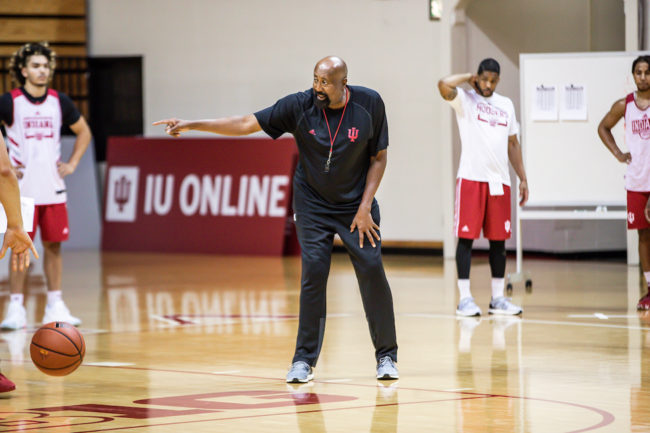
What You See Is What you Get: Men’s Basketball Coach Mike Woodson
When Mike Woodson was announced as the next IU men’s basketball coach, the former Hoosier star promised to bring back the storied program’s winning tradition. He should know how, having played under legendary coach Bob Knight from 1976–1980 followed by a successful career both playing and, since 1996, coaching in the NBA. He is the fifth coach to lead the Hoosiers since Knight was fired in 2000, and the hopes for a sixth NCAA Championship banner weigh heavy on his shoulders.
BLOOM: Michael Cassady, owner of The Uptown Cafe, says that you’re there frequently and that unlike some past coaches, you don’t eat in the private dining room—that you’re approachable, friendly, that people talk to you, you talk to them. Are you always like that?
WOODSON: I’ve always been that way. I was that way as a player and as a coach. I think it’s because I had a pretty cool upbringing. Even though I lost my parents at an early age, they left an imprint. And playing for [Broad Ripple High School coach] Bill Smith, coming to IU—they all set the tone in terms of my development as a basketball player and as a man.
In high school and in college, people were so supportive of me that I couldn’t help but be open and supportive and be kind to people because that’s what it’s all about. And for me to come back here, and people welcomed me back like they did. My walk around campus was pretty good, man. Everybody wants to know, “How are we going to be this year? How’s the team looking?” And all I can tell them is, man, I’m going to do everything possible to put this team back on top, and that’s why I came back here.
BLOOM: Your first big win was convincing Trayce Jackson-Davis to return when he could have gone to the NBA. How hard was it and how important was it to have him back on the team?
WOODSON: It was huge. He’s our best player. When I took over, I gave this speech to a group of players who didn’t know who Mike Woodson was, and when I asked those guys who would stay, six of the probably best players didn’t raise their hands. That was tough. So, we evaluated the situation and came up with a game plan that was to go after the best player and try to keep him on board, and that’s what I did.
I sat down with Trayce and his parents and I had put together a game tape that probably wasn’t real pleasant for him because there was nothing positive on it. It showed him all the things that I thought he could do better instead of the things he was doing. It took him a while to see it. About halfway through the tape, he mentioned that there was nothing good on it.
After this film session he and his dad needed a chance to talk, and after they spoke, he came back and said he was on board and wanted to stay. So that was the starting point of trying to build our team and get to where we are right now as we speak.
BLOOM: It seems that what Jackson-Davis needs to do is be able to score away from the basket. He tried very few shots away and mostly wasn’t successful. Is that what you think he needs to work on most importantly?
WOODSON: I think you’re right and for him to make the next jump, he’s going to have to be dominant with both hands. The right hand has got to be defined a little bit more. And, yes, he’s got to develop at least a 15-, 16-, 17-foot shot. And if he can develop those, then I think the NBA will welcome him with open arms. And I think it will make us much better. He does not have to play with his back against the bucket all the time. He can step out, make that little shot or make plays off the dribble.
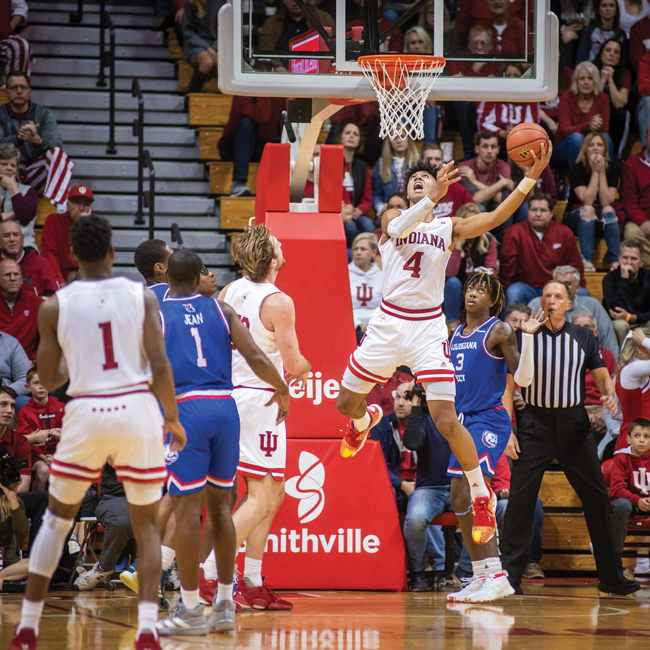
BLOOM: He needed some big man help around the basket last season. Is he going to get it this year?
WOODSON: Yes, with Michael Durr, who we brought in. He’s a good 6-foot-11 kid who’s not as athletic, but you can throw him the ball down there and he can score. He catches the ball well and he finishes around the bucket. He’s got a nice little soft shot. And he’s an excellent rebounder.
BLOOM: Two things that have been so frustrating as a fan the last few years are the awful foul shooting, and the fact that we haven’t had a good 3-point shooter. How do you fix the foul shot problem? And will we have a 3-pointer shooter this season?
WOODSON: Well, the only way you to fix free throws is, you’ve got to shoot a lot. And from a coaching standpoint I have to get in between the ears of a lot of these guys. Free throws are free. You’ve got to feel good about stepping to the line and putting them in. I’ve always said with free throws, 90% of it is in the head. The other 10% is mechanics. So, you know, I’ve got to instill some confidence in them and then we’ve got to shoot a shitload of them.
As for threes, I think we’ll will be a bit better this year with Miller [Kopp], Xavier [Johnson], and Parker [Stewart] coming in. [Trey] Galloway can make some, and Race [Thompson].
BLOOM: How would you describe yourself as a coach? Are you a strategist, a players’ coach, defense first?
WOODSON: I’m just a coach, man. I’m a guy that has learned a lot of systems that work for a lot of wonderful coaches over the years and I’m just trying to piece it all together. You’ve got to compete on both sides of the ball—I figured that out a long time ago. You’ve got to be good offensively, and you’ve got to be great defensively in terms of getting stops and rebounding the basketball so you can go play offense. Guys have to be on the same page at the same minute, hitting open guys. And I need to know when you need a plug-in; who’s the guy to go to. There’s a lot of ways you can win basketball games.
Coaching is tough, guys, and I can’t sit here and tell you what kind of coach I am. I like to think I’m a players’ coach. When I just coach, I don’t play favoritism even with superstars. If they need it, I’m going to be on their ass. That’s just the nature of the business and I think you can be that way. If these players understand that you’re in their corner, and you really love what they’re about, and, you know, that’s just who I am. I’m not here to tear anybody down. I’m here to help everybody in a uniform who’s willing to accept help. Because at the end of the day it’s just coaching—that’s all it is. I’m, not trying to be anybody but Mike Woodson. Trying to win basketball games, that’s what I’m about.
BLOOM: We have to ask you about this the whole NIL situation and players getting paid. You know, I’m sure over the years you’ve given this some thought—what’s your feeling about players making money?
WOODSON: Well, it’s going to change the dynamics of college basketball. And if you’re not on the cutting edge of it I don’t know how you can compete. I don’t know if it’s going to be for the good or the bad, but I’m not against these players getting paid.
BLOOM: Who’s the guy that the fans and the media may not know right now that could make a big impact this year?
WOODSON: I’ve watched Rob Phinisee now for several weeks, man, and he’s playing much better than I saw him in the past, for whatever reason, which is good for us. He’s an older guy who’s been around the block, and he’s played in the Big Ten and hadn’t had a lot of success. But I think he could play at a high level.
BLOOM: Any final word for fans and the media?
WOODSON: You know, I’ve never had battles with media, and the media has picked on me some over the years, but that’s a part of it and I get it. But hey, what you see is what you get. I’m not going to sell you a bunch of bull. I’m here to work, man. I’m trying to win a Big Ten and the national title, and I’ve got six years to try to get it done.
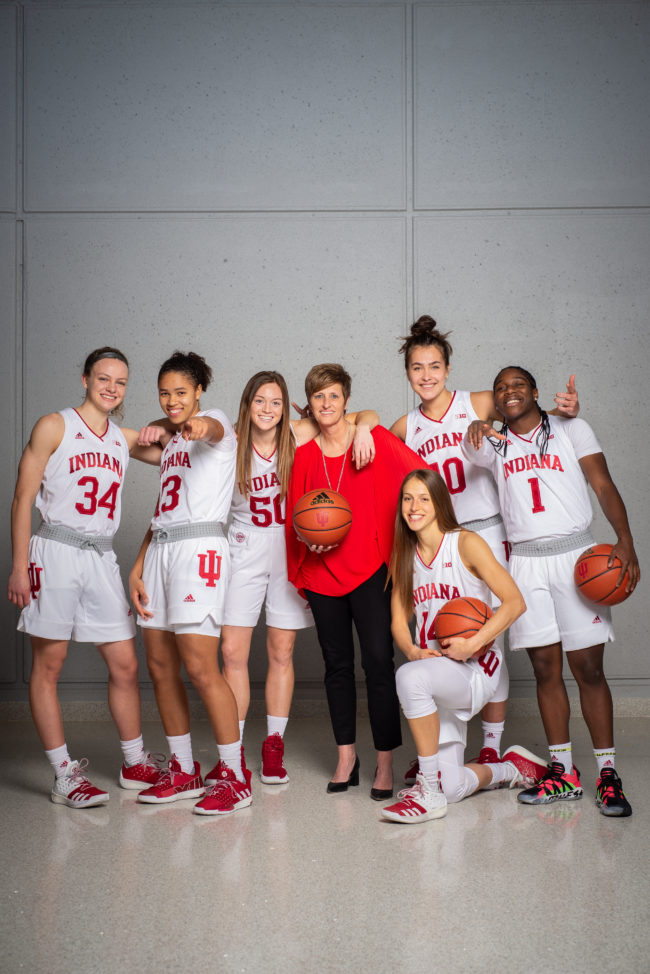
A Blue-Collar Mentality: IU Women’s Basketball Coach Teri Moren
In seven seasons as head coach, Teri Moren has led the IU women’s basketball team to previously unseen heights. The Hoosiers finished the 2020–21 season at 21-6, including 16 Big Ten wins, and reached the Elite Eight for the first time ever. With all five starters returning, the expectations for an even deeper run in the NCAA Tournament are high.
BLOOM: Last year you got all the way to the Elite Eight and now the expectations are incredible. Are you feeling more pressure than usual?
MOREN: I’m a firm believer that if you do the work, that the success follows. So, I don’t feel the pressure of it—I’m not surprised by any of it. The goal when we set out here seven years ago was to build a program that was going to be successful and get into the tournament, make deep runs, ultimately win a championship. This is just part of it. This is exactly what I thought it would feel like, and it’s been an incredible journey so far, but we have much more to do.
BLOOM: Probably every women’s coach for the last three or four decades has said some of the same things—we want to build a program, we know where we want to go—and none of them were able to achieve it. What have you done that other coaches may not have?
MOREN: I don’t know what their vision was. Here’s what I do know: You don’t build something without the right pieces in place, and that starts with making sure that you have incredible people around you and each of them brings something different to the table. We call this an egoless office. We just want to help our players the best way we can to be successful, and that’s the other piece of it. You’ve got to find players that will buy in and be brought in to your vision.
I’m from a blue-collar family from southern Indiana, brought up by my grandparents because my mom and dad were working. And so this blue-collar mentality that I’ve always had, we’ve just brought it into this workspace. We’ve been intentional on recruiting the types of kids that fit us, and they all have to have a blue-collar attitude of some type. You’re not going to win a championship only showing up to practice an hour and a half, two hours, four or five days a week; it’s going to take more to do that. We’ve made working hard cool. Now these younger kids walk into our program and they see those others, those vets, doing that type of work, and it becomes, ‘Oh this is what we do here.’ We’ve identified players that fit us, that want to work—doing more than what’s required.
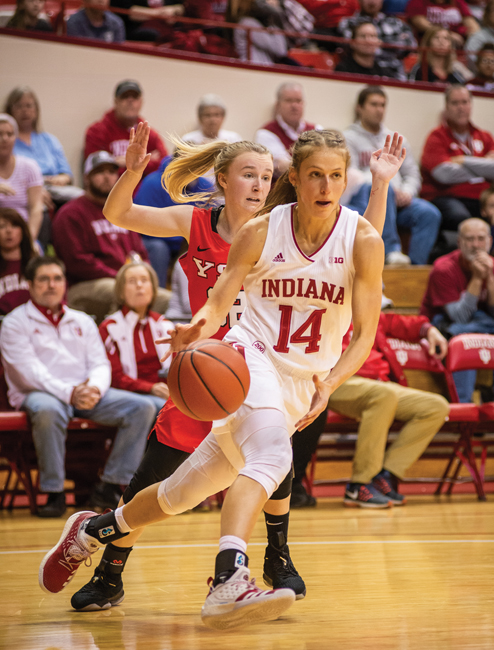
BLOOM: When we did the cover story on the women’s team a couple years ago, I thought it was very interesting watching the players around you. In the picture we used on the cover, Brenna Wise had her arm draped over your shoulder. I can’t imagine anybody doing that to Bobby Knight or even Archie Miller. There wasn’t that formality, that distance. Can you talk about that?
MOREN: You know, winning is important, we want to be successful. But what’s more important to me is that I’m having an impact and our staff is having an impact on these young women in a world that’s changing. And it’s changing fast. Just helping them develop into strong women is something that is a priority for me, and I think that comes from being invested in them, listening to them, engaging with them every single day. That’s what makes it so special, because they know
I love them, because they know I care about them, because they know I have no agenda other than just wanting to help them. It makes it so much easier when I’m on their rear ends in practice, or when I put their feet to the fire, because they know it’s coming from the right place. I just want the best for them.
BLOOM: What you just said describes the chemistry between you and the players, and the players and each other. One of the expectations of these returning starters is to carry that chemistry to the bench, to the younger players, the new players. What other expectations do you have of that returning group?
MOREN: I think the great thing we have is leadership, from Ali Patberg, Grace Berger, and the other pieces—the Nikkis [Nicole Cardaño-Hillary] and the Aleksas [Aleksa Gulbe] and the Macs [Mackenzie Holmes]. I don’t have to walk into our film room and tell them what the goal is there—they already know what the goal is. That’s a great thing about those kids, to have the opportunity to go down to San Antonio [for the 2021 NCAA Tournament] and make a deep run, they got a taste of it. And they liked it. They really liked it. My job and our staff ’s job is to prepare the best way we can to put them in a situation to have success, because they’re going to ultimately follow the game plan, they’re going to do everything we’re going to ask them to do.
BLOOM: Tell us about the incoming freshmen.
MOREN: Kaitlin [Peterson] is a point guard out of Alabama and probably the quickest kid we’ve seen with the ball in a long time. We recruited our freshman class on Zoom, so we have never seen them face to face. I can only tell you what I’ve seen on film with she and Keyarah [Berry], as far as their athleticism. Both are elite athletes, great scorers, obviously the best players in their high schools. Keyarah has almost 3,000 points in high school.
They’re going to be far from home, so that’s always the first test, making sure that they’re comfortable, they feel good in their environment, and that they’re ready to go to work. Mona’s [Mona Zarić] a stretch four from Serbia that’ll
be coming in, and I probably should point out also Kiandra Browne—we consider her a freshman, even though she was here for a year last year. She came in with the intentions of sitting out a gap year, and so she sort of starts all over again as a freshman.
BLOOM: Are you still recruiting for this year?
MOREN: There’s this thing called the transfer portal. Every day you’re looking at the portal just to see if there’s anybody in there. When we’re building our depth, the one challenge that we have is convincing kids to come to Indiana. And when I say this, I say it respectfully. The kids in the portal that we feel can help us right now don’t want to come in and not start, or they want to play a bunch of minutes. I think there’s a little bit of hesitation for those kids that are in the portal to look
at Indiana and go, ‘Oh, I could see myself getting minutes here or there.’ So we’re really gonna have to rely on some of our young kids, the Chloe Moore-McNeils and the Kaitlins, Keyarahs, and Monas that’ll be here—the Kiandra Brownes—and we’ve really got to do a great job of getting them ready.
BLOOM: Okay, one final silly question. You’re from Seymour. I only know one other person from Seymour—John Mellencamp. So, are you guys buds?
MOREN: One of the great things about Hoosier Hysteria is that we always get to pick out the song that we’re going to come out to. And in my seven seasons that I’ve been here, I always come out to a Mellencamp song. So, if you can get him to Hoosier Hysteria, I mean, he could serenade me. I can’t find anybody that has a strong enough connection to John to get him to do that for me, so if you guys can arrange that …
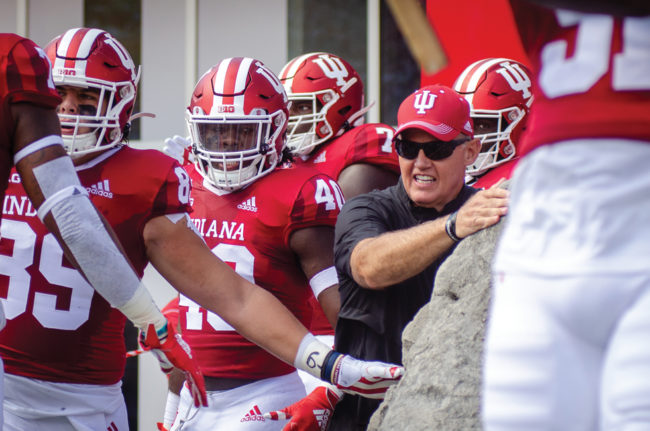
Accountability Is the Key: IU Head Football Coach Tom Allen
Last season, his fifth as head coach, Tom Allen took the team to their best season in more than seven decades. The Hoosiers finished ranked seventh in the AP poll and eighth in the coaches’ poll and Allen was named National Coach of the Year. The Hoosier Nation is hoping for even bigger things in 2021.
BLOOM: Congratulations on a great year. But, for the upcoming season, there is probably the highest expectation in decades for an Indiana football team. Feeling any pressure?
ALLEN: No. I mean, I’m excited because when I got here, we talked about changing expectations and creating belief. So, when that happens, you can’t fear it. You can’t plan for something, prepare for something, and when it starts happening, you can’t run from it. I’m excited; I believed this would happen.
BLOOM: Michael Penix Jr. is so important. He is one of the best quarterbacks in the country. And yet, he seems fragile physically. Although he’s a good runner, he was only used to carrying the ball in short, desperate- yardage situations. Times like going for the two-point winning conversion against Penn State. And yet, the play that he got injured on was one of the only times where he carried the ball and it wasn’t a desperate situation. He made about 20 yards on the play, but basically, he didn’t even get tackled. He just sort of slipped when he went out of bounds. Are you doing anything to protect him this season, to make him stronger?
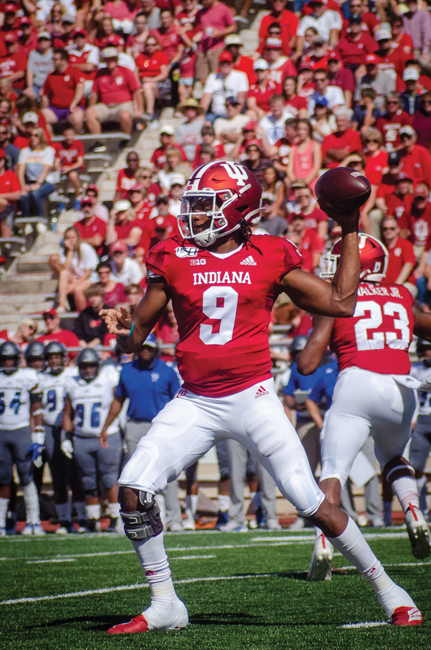
ALLEN: There’s no reason to put him in harm’s way unnecessarily. But it is a contact sport, and when you’re a defensive coach and a defensive player you have one objective, and that’s to affect the quarterback. You want to harass him mentally and physically. Knowing that, you know that’s what everybody else’s goal is as well.
There’s no doubt that we’re not going to be running all those quarterback designed run calls, but there’s going to be times he’s not running and the play breaks down, you can’t just say, ‘Hey, timeout.’ In a very intense, purposeful way, we’re beefing up his body, gaining good solid weight dietarily.
The way he was injured last season, I agree with you, I saw him run out of bounds and I just thought he tripped. I never dreamed it was what it was because it never looked like it could possibly be that serious. So, we’re doing everything we can, but at the same time, we have two quarterbacks and Jack Tuttle played really, really well when he came in against Maryland, and played very well against Wisconsin. To me, we have two starters on our team that have proven they can win Big Ten games. So yes, Michael’s definitely a priority to keep him healthy, but it’s tackle football and you’ve got to play the game.
BLOOM: The transfer portal has become this omnipresent factor in the offseason. How has that changed the game for IU?
ALLEN: There’s no question it’s made a very big change in our game. And it’s one of those things where you know whether you voted for it or not, like it or not, it’s one of the rules now, so you’d better embrace it, you’d better be able to maximize it. You know we don’t recruit junior college players, so that’s not allowed us to ever go after older players. Then they started having grad transfers and even that was challenging because our grad schools are legitimate, bona fide grad schools that take a strong GPA to get into, and not every school is like that. Trust me, I’ve been other places. So, we’ve not had a lot of opportunities to bring in grad transfers. The portal has given us a chance for the first time to bring in older players that can really address our needs.
BLOOM: I thought one of the best moments of the season occurred when you were being interviewed on TV after a win and Stevie Scott and other players came by to hug you, and I believe it was Dylan Powell who yelled out, “Recruits, come play for this man. Best coach in America.” Was that special moment for you?
ALLEN: It was a special moment because it was impromptu. It was on their way to the locker room after we had beaten Wisconsin. All those guys had gotten here before the breakthrough of even 2019. They came here and they believed in the vision of what we thought we could do. There is genuine love and respect, mutually, both directions, you know, from me to them and them to me and all our coaches and this whole culture we built here. But those relationships take time, and that’s why I think it was special because it was from the heart, and it was just authentic and it gave you a little bit of a snapshot of who we are as a team.
BLOOM: Obviously you’ve been incredibly successful as a motivator, as a strategist, and as an all-around good human being, and that earned you National Coach of the Year. But I know you get some criticism for your mantra, LEO—Love Each Other.
ALLEN: It’s all about accountability. That’s a big, key piece of LEO that I think people miss. They embrace and latch on to the word love, and in the beginning, it was kind of misunderstood. They thought that was soft, that wasn’t manly, and that’s not how you run a football team.
I consider there are three levels of accountability. When you try to build a program we say, “These are the standards, this is our expectation, this is what we believe, this is what we’re going to do, this is how we’re going to function on a daily basis,” and you hold everybody in that organization to those standards. And that’s where the consistency comes in, and that’s where the respect is built, because if I just say it, and I don’t do it, you won’t respect me.
But if my words match my actions, over time that creates a lot of trust and respect, and then eventually, man, there’s a strong bond that is developed. The players are Step 2 in accountability; it’s the players taking ownership of themselves towards those standards. And then the third level, which I thought was what happened in 2019, the players start holding each other accountable. And that, to me, is when the program took off.
Then there’s the relationship piece. I spend a lot of time with our guys. I sit down with our guys, I want to know what they want, what are their dreams, what are their goals for their future, and I write it all down. Then I hold on to that, and if their behavior and their actions don’t match up with their goals, we sometimes penalize them for it. That’s tough love.
It’s not all hugging each other. My practices are tough. I’m hard on these guys, it’s holding people to high standards. It’s being consistent. And when they know you care about them, you can push them way harder than you could if they did it because I said so.
BLOOM: Last season, you won your division according to the rules at the beginning of the season. And then the Big Ten changed the rules in favor of Ohio State. It was suggested by someone extremely knowledgeable that there exists in the Big Ten a prejudice against IU—that teams who have been beating IU for decades aren’t thrilled with IU’s ascension. Have you felt that at all?
ALLEN: I’ll be careful what I say here. You know we’ve all lived long enough; we all know human nature well enough to know that when things become different, it can become uncomfortable. It causes things to be viewed a certain way, and we’re still in the process of doing that. The way things were handled in the postseason situations, we got judged based on our past, and I think that’s unfair. It’s human nature to do that and it’s hard to overcome. I did feel that we had our chance to beat Ohio State, and had we beaten them head-to-head, and then some other weird kind of rule got manipulated and we still didn’t get to go, then I would have been hot and I’d have been out of the center stage, leading the band and saying, ‘This is wrong.’ But we had the opportunity, and they beat us on the field. We have to prove that we are legitimate year after year and can win the big one. We’ve not put those years back- to-back-to-back together yet. We’re still in the process of building.
BLOOM: When you wake up in the morning, what excites you about this team as you approach the 2021 season?
ALLEN: Well, that we have a team full of guys that have been here since the beginning. We have a strong leadership council group that I feel like is very intrinsically motivated to do great things in 2021. They weren’t satisfied with 2020, even though we had some very historic wins. There’s things these guys want to accomplish before they leave Indiana. Football is a game of belief and it’s a game of passion; it’s a game of intensity and requires an internal fire. I think that a lot of our guys have that. It burns inside of them, and I know that’s inside this coaching staff. I’m excited about where we are, for sure, because I think we’ve got a football team that’s hungry, and it’s got something to prove.


